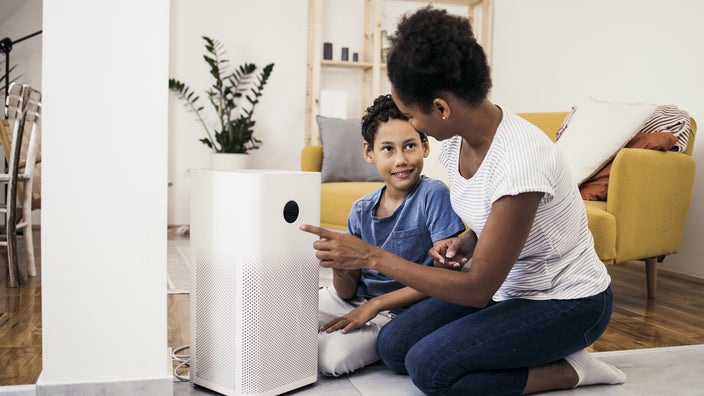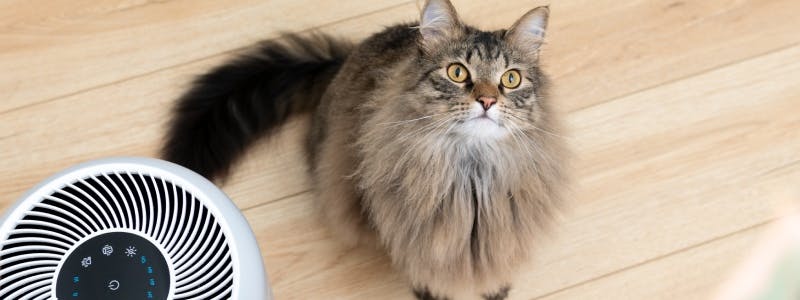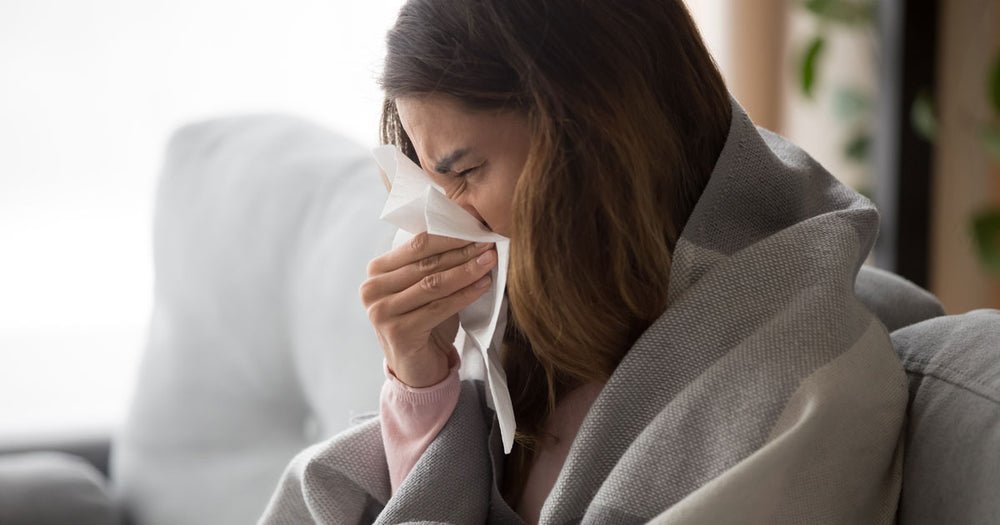Yes, air purifiers can help with hay fever symptoms. They remove allergens from the air, reducing sneezing and itchy eyes.
Hay fever, also known as allergic rhinitis, affects millions of people worldwide. Pollen, dust mites, and pet dander are common triggers. These allergens can make daily life uncomfortable. Many people seek ways to alleviate their symptoms. One effective solution is using an air purifier.
Air purifiers work by filtering out tiny particles from the air. This can significantly reduce the number of allergens you breathe in. As a result, your hay fever symptoms may improve. In this blog post, we will explore how air purifiers can help with hay fever symptoms. We will also discuss what to look for in a good air purifier. Stay with us to find relief for your hay fever.
Credit: magnoliacompanies.com
Introduction To Hay Fever
Hay fever, or allergic rhinitis, affects millions of people. It can make daily life uncomfortable. Many seek ways to ease their symptoms. One question people ask: Can air purifiers help with hay fever symptoms? To understand this, let’s first learn about hay fever.
Common Symptoms
Hay fever has many symptoms. Sneezing is common. Your nose may run or feel stuffy. You might have itchy eyes. Some get a sore throat. Others have a cough. Symptoms can make you feel tired. They can affect sleep. They can disrupt daily activities.
Causes Of Hay Fever
Hay fever is caused by allergens. Pollen is a common trigger. Grass, trees, and weeds release pollen. Dust mites are another cause. Pet dander can trigger symptoms. Mold spores also play a role. These allergens enter your body. Your immune system reacts. This causes the symptoms of hay fever.
What Are Air Purifiers?
Air purifiers are devices that clean the air in a room. They remove contaminants such as dust, pollen, and smoke. People with allergies and respiratory issues often use air purifiers. These devices improve air quality, making it easier to breathe.
Types Of Air Purifiers
There are different types of air purifiers available. Each type has unique features and benefits. Here are some common types:
- HEPA Filters: These are the most common type. They remove 99.97% of particles that are 0.3 microns or larger.
- Activated Carbon Filters: These are good for removing odors and gases. They absorb pollutants and keep the air fresh.
- UV Light Purifiers: These use ultraviolet light to kill bacteria and viruses. They are effective in sterilizing the air.
- Ionic Purifiers: These release negative ions into the air. The ions attach to particles, making them easier to capture.
How Air Purifiers Work
Air purifiers work by drawing in air from the room. The air passes through various filters. Each filter targets different pollutants:
- Pre-filter: Captures large particles like dust and hair.
- HEPA filter: Removes tiny particles like pollen and pet dander.
- Activated carbon filter: Absorbs odors and chemical fumes.
- UV light or Ionizer: Kills bacteria and viruses or charges particles for easier capture.
The clean air is then released back into the room. This process repeats continuously, ensuring the air remains clean.
Air Purifiers And Hay Fever
Hay fever, also known as allergic rhinitis, affects millions of people worldwide. It causes symptoms like sneezing, runny nose, itchy eyes, and congestion. These symptoms are triggered by allergens such as pollen, dust mites, and pet dander. An effective way to reduce these allergens in your home is by using an air purifier. But how well do air purifiers work for hay fever relief?
Effectiveness For Allergens
Air purifiers are designed to remove particles from the air. They use filters to trap dust, pollen, and other allergens. HEPA filters (High-Efficiency Particulate Air) are especially effective. They can capture up to 99.97% of particles as small as 0.3 microns. This includes many common allergens.
Using an air purifier with a HEPA filter can help reduce the number of allergens in your home. This may lead to fewer hay fever symptoms. Keep in mind, though, that while air purifiers can remove allergens from the air, they cannot eliminate allergens that have settled on surfaces.
Scientific Studies
Several scientific studies have examined the effectiveness of air purifiers for hay fever relief. One study found that air purifiers with HEPA filters reduced allergen levels in bedrooms by 50% to 70%. Participants in the study reported fewer and less severe symptoms.
Another study showed similar results. It found that using an air purifier could improve sleep quality for people with hay fever. This is because fewer allergens in the air can lead to less nighttime congestion and better breathing.
Overall, scientific evidence supports the use of air purifiers to reduce allergen levels and ease hay fever symptoms. While they are not a complete solution, they can be a helpful part of an overall strategy to manage hay fever.

Credit: www.goodrx.com
Choosing The Right Air Purifier
Choosing the right air purifier is key to relieving hay fever symptoms. Not all air purifiers are created equal. Some are better suited for capturing allergens than others. Knowing which features to look for can make a big difference. This section will guide you through the essential features to consider.
Hepa Filters
HEPA filters are crucial for anyone with hay fever. HEPA stands for High-Efficiency Particulate Air. These filters can trap 99.97% of particles that are 0.3 microns in size. This includes pollen, dust, and other allergens. A purifier with a true HEPA filter is more effective than one with a HEPA-type filter.
Look for the following features in a HEPA filter:
- Certified true HEPA filter
- Long-lasting: Some filters last up to one year.
- Easy to replace: Ensure the filter is easy to change.
Additional Features
Beyond HEPA filters, other features can enhance the air purifier’s effectiveness. Consider the following:
| Feature | Benefit |
|---|---|
| Activated Carbon Filter | Reduces odors and VOCs (volatile organic compounds) |
| UV-C Light | Kills bacteria and viruses |
| Smart Sensors | Adjusts the purifier’s settings based on air quality |
| Quiet Operation | Ensures a peaceful environment |
Some purifiers also offer automatic mode. This mode adjusts settings based on air quality. This can be very convenient. Portable models are also a good choice. They can be moved from room to room easily.
Choosing the right air purifier involves considering multiple factors. Focus on the features that best address your specific needs.
Using Air Purifiers Effectively
Using an air purifier effectively can significantly reduce hay fever symptoms. Correct placement and regular maintenance are essential for optimal performance. This guide will help you maximize the benefits of your air purifier.
Placement In Home
Where you place your air purifier matters. Place it in rooms where you spend the most time. Bedrooms and living rooms are ideal. Ensure the purifier is away from walls and furniture. This allows for better air circulation. Avoid placing it near windows or doors. This prevents outside pollen from entering.
Maintenance Tips
Maintaining your air purifier is crucial. Check and replace filters regularly. A clogged filter won’t work effectively. Follow the manufacturer’s instructions for filter changes. Clean the unit’s exterior weekly. Dust and debris can reduce efficiency. Ensure the purifier’s sensors and vents are clear. This helps maintain optimal performance.
Set a reminder for regular maintenance. This keeps your air purifier working well. Regular upkeep ensures a cleaner, healthier home environment.
Additional Ways To Alleviate Hay Fever
While air purifiers can help with hay fever symptoms, there are other effective methods too. Combining these methods with an air purifier can provide better relief.
Lifestyle Changes
Adopting certain lifestyle changes can significantly reduce hay fever symptoms. One effective change is keeping windows closed during high pollen seasons. This prevents pollen from entering your home. Using air conditioning with clean filters can also help. Staying indoors during peak pollen hours, usually mid-morning and early evening, can reduce exposure.
Another helpful tip is to shower and change clothes after being outside. This removes pollen from your body and clothes. Keeping pets clean is also important. Pets can carry pollen indoors on their fur. Regular grooming and wiping their paws can help.
Over-the-counter Medications
Over-the-counter medications provide quick relief for hay fever symptoms. Antihistamines are commonly used. They help reduce sneezing, itching, and runny nose. Some popular options include cetirizine and loratadine.
Nasal sprays can also be effective. They help reduce nasal congestion and inflammation. Saline sprays are a good choice for clearing nasal passages. Decongestants can provide short-term relief from nasal congestion. However, they are not recommended for long-term use.
Always read the labels and follow the instructions on these medications. Consult with a healthcare professional if you have any concerns.
Pros And Cons Of Air Purifiers
Hay fever sufferers often seek relief from symptoms like sneezing and itchy eyes. Air purifiers can be one solution. This section explores the benefits and potential drawbacks of using air purifiers.
Benefits
Air purifiers can offer several benefits for those with hay fever:
- Reduces allergens: Air purifiers can capture pollen, dust, and pet dander.
- Improves air quality: They help in maintaining clean indoor air.
- Easy to use: Most air purifiers are plug-and-play devices.
- Silent operation: Many models operate quietly, ensuring a peaceful environment.
Potential Drawbacks
Despite the benefits, air purifiers also have some potential drawbacks:
- Initial cost: High-quality air purifiers can be expensive.
- Maintenance: Filters need regular replacement, which can be costly.
- Limited range: They are effective only in the room they are placed.
- No cure: Air purifiers do not cure hay fever, they only alleviate symptoms.
To summarize the pros and cons of air purifiers, refer to the table below:
| Pros | Cons |
|---|---|
| Reduces allergens | High initial cost |
| Improves air quality | Regular filter replacement |
| Easy to use | Limited to one room |
| Silent operation | Does not cure hay fever |
Conclusion And Recommendations
Can air purifiers help with hay fever symptoms? Let’s summarize our findings and provide final thoughts on this topic. Our goal is to help you make an informed decision.
Summary Of Findings
Air purifiers can reduce hay fever symptoms. They remove allergens like pollen, dust mites, and pet dander from the air. This leads to cleaner indoor air and fewer allergy triggers.
- HEPA filters are effective in capturing tiny particles.
- Activated carbon filters help with odors and gases.
- UV purifiers can kill bacteria and viruses.
Using an air purifier can make a significant difference. It can improve overall air quality and reduce allergic reactions.
Final Thoughts
Investing in a good air purifier can be beneficial. It helps in reducing hay fever symptoms and improving indoor air quality. Choose a purifier with a HEPA filter for the best results.
Remember to keep your home clean. Regularly vacuum carpets and wash bedding to minimize allergen buildup. Combining these steps with an air purifier can provide relief from hay fever symptoms.

Credit: www.flonase.com
Frequently Asked Questions
Can Air Purifiers Reduce Hay Fever Symptoms?
Yes, air purifiers can help reduce hay fever symptoms. They remove allergens like pollen from the air. This can alleviate symptoms such as sneezing and itchy eyes.
How Do Air Purifiers Help With Hay Fever?
Air purifiers use HEPA filters to trap pollen and other allergens. This can improve indoor air quality and reduce hay fever symptoms.
Are Air Purifiers Effective For Hay Fever?
Air purifiers are effective in reducing indoor allergens. They can significantly lessen hay fever symptoms, especially when used consistently.
What Type Of Air Purifier Is Best For Hay Fever?
HEPA air purifiers are best for hay fever. They effectively capture pollen, dust, and other allergens, providing relief from symptoms.
Conclusion
Air purifiers can ease hay fever symptoms. They remove allergens from the air. Cleaner air can mean fewer sneezes and less itching. Using an air purifier is a simple step. It adds comfort to your home. For best results, choose a purifier with a HEPA filter.
Stay consistent with its use. Over time, you may notice a difference. Breathe easier and enjoy your space more. Consider trying an air purifier today. Your health and comfort matter.
Rakib Sarwar is a Registered Pharmacist and a reputed health and wellness blogger. He has a great interest in Air purifiers.
